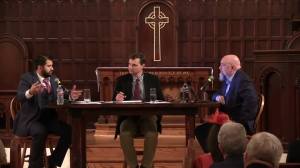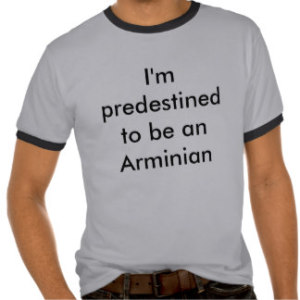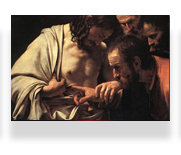Salvation, Predestination, Calvinism and Molinism (Question #26)
Hey Eric, I watched the debate and I loved it. I enjoyed seeing a mature christian operating in his spiritual gift. Thought you used presuppositional apologetics in the correct way. I see it used so harshly by some, Sye as an example. I was encouraged to see Dillahunty meet a Christian who is not only learned, but speaks with respect to 
I was wondering if you could help me with something. I’ve struggled with Calvinism for sometime but reject it due to its implications in regards to fatalism and God’s loving nature. I struggle with thinking that my view of his universal loving nature in regards to salvation may be an unbiblical presupposition.
In regards to God’s loving nature, I want to agree with Geisler and say that God freely offers salvation to all, and that man can freely choose God, aided by the Spirit, I just see less and less support for it in scripture. I go to Calvary and my pastor teaches the antimony of election and free (depraved) will. I just can’t see how they can both coexist seeing that man is spiritually dead apart from God, that no one seeks God, and that he must be quickened by the spirit in order to exercise faith.
What I specifically don’t see is any man who can be made spiritually alive and then resist that grace and become dead again. Geisler’s view that God is all loving, therefore he loves all salvifically begs the question why Paul in Romans 9 would assume that men reading his epistle would naturally find injustice with God saying I will have mercy on those whom I will have mercy, and again why he says how are we to call God to account?
I see Augustinian monergism as a road that can only lead to double predestination (that God also from the beginning consigns many to hell), and for that reason I shudder, almost revolting feeling. Then I wonder who am I to question God, is he not 
The way my pastor exegetes Romans 8, “for whom he forknew he predestined” in the Greek leaves no room for middle knowledge. This is one reason I have such a hard time. I feel like my pastor gives ample ground for fatalism, but later outright rejects it with proof texts. Most of my very close friends and brothers in the faith have become Presbyterian for this reason.
James White and Johnny Mac say this is the reason so many Calvinists come out of Calvary. Middle knowledge, to the best of my understanding means that God chose the best road giving men freedom to choose with all things arranged in the way that he wants them to occur, thus knowing the end from the beginning. It seems however, to contradict election and God’s sovereignty. What I mean by that is, if man is spiritually dead, are enemies of God, and he can come to God only by the call of God (John 6), then how can the best possible path be chosen that allows for men to freely come to him, since they can’t without God first calling them?
-Brad F.
Response:
Thank you again for your very kinds words. That means a lot to me.
I must clarify though that I do not hold to the presup apologetics. I am what you would call a classical apologist. That is NOT to say that I am an evidentialist. I do believe The Holy Spirit is the primary way of knowing the truth of God but I also 
Regarding salvation, election, grace and so forth, let me respond by first addressing the passage in Romans 9. Here, we must understand the context in which Paul is speaking. Many Calvinist read this passage as a proof text for believing that God is the one who chooses who will and will not be saved. It goes on further to say that we are no one to question His decision. However, this is not at all what Paul is talking about.
In a nutshell, Paul is addressing the belief of certain Jews who think that they have some special privilege to salvation simply based on their ethnicity. However, Paul here is arguing for the view that God could choose to grant salvation to whomever He wishes. That is, He can choose who can and cannot be part of the elect, including the very Gentiles they despised, even if this idea upset some of the Jewish people.
That is why in Romans 10:12-13 Paul goes on to say, “There is no distinction between Jew and Greek; the same Lord is Lord of all and bestows his riches upon all who call upon him. For ‘everyone who calls upon the name of the Lord will be saved”, and earlier in Romans 3:9 “Or is God the God of Jews only? Is He not the God of Gentiles also? Yes, of Gentiles also..”
In regards to double predestination, you are absolutely correct. If the Calvinist is 
However, if God’s character is true, loving, just and right, then it is logically contrary to say that man has no free will and is forced by God to go to hell or do evil. On this view, God is the author of evil seeing how He is the one who controls a persons will. This is the same problem with fatalism.
Middle knowledge:
“Those whom He foreknew He predestined” is simply describing that God knew what it would take for any person to freely respond to the call of salvation and has predestined all that was necessary to achieve this as a free act of the person. However, if you view this in a Calvinist perspective, then this is really just a tautology. In other words, it would simply read, “The ones whom God knew He would choose to be saved are the ones whom God knew He would choose to be saved”.
Regarding your issue with Molinism, it is evident in scripture that God wants and wills that all are saved (1 Timothy 2:4). So if God wills it, but it does not happen, then it is obviously not up to God who will and will not be saved. The solution that Molinism offers is that God knows what it will and will not take to allow someone to freely choose to be part of the elect group of those that are saved. However, by default, this also means that God knows that some people will simply never choose to be saved, regardless of what God does or does not do. Thus, God in His sovereignty can bring about the best possible outcome by setting up the circumstances that will result in the free acts of people that will ultimately bring about His will.
Let’s try this with an example. Say God knows that person “x” will freely reject God no matter what happens. And let’s say that person “y” WILL receive salvation if and only if someone leads them to seriously think about life’s toughest questions. So let’s say God arranges things in such a 
Thus, because of all the studying and research, they have become a deeply committed Christian, and even an apologist! Mind you, ALL of this happened only by the sovereignty of God using the free choices of person “x” and person “y”. Thus, God remains sovereign, His will (which includes the knowledge of what can and cannot happen freely) is accomplished, and freedom is preserved in every action.
-Eric Hernandez
Related Articles:



Related Resources:



Got a question? Submit any questions regarding God, Philosophy, Apologetics, Theology, Christianity. Or the like to our ministry via Facebook, Youtube or our Website. Thank you and God bless.


